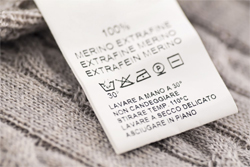When it comes to purchasing sustainable or environmentally responsible clothing, consumers are, in the most part interested, or say that they are interested, in doing ‘the right thing.’ One of the biggest hurdles to overcome is lack of consumer trust in labelling, and confusion over which products are genuinely more ecologically responsible.
In a recent conversation with Ecotextile News on the issue of product labelling, Lucy Atkinson, assistant professor, Stan Richards School of Advertising & PR, University of Texas at Austin, told us: “My own research indicates that consumers want labels that provide information and context. They prefer detailed labels over simple ones. When presented with them, consumers are likely to rate them as more trustworthy and more useful.
“Likewise, the source of the label matters. In studying US consumers, I’ve found that many of them prefer government or third-party issued labels over those managed by corporate entities.
“These labels are viewed as more trustworthy and more useful. Yet, consumers still have positive evaluations of private labels and report greater liking for a company when it engages in eco labelling. It suggests important areas of potential cooperation between public or third-party labels and private labels,” she added.
Atkinson’s research highlights the need for such as web-site, saying that the label “natural”, often applied to cotton and hemp garments, is vague, often misleading and inconsistently applied across products resulting in something of very little use.
Yet the majority of consumers, according to Atkinson, view the label “natural” as something desirable and as a value added to the product. Many are willing to pay more for it even though, more often than not, it is a meaningless label.







